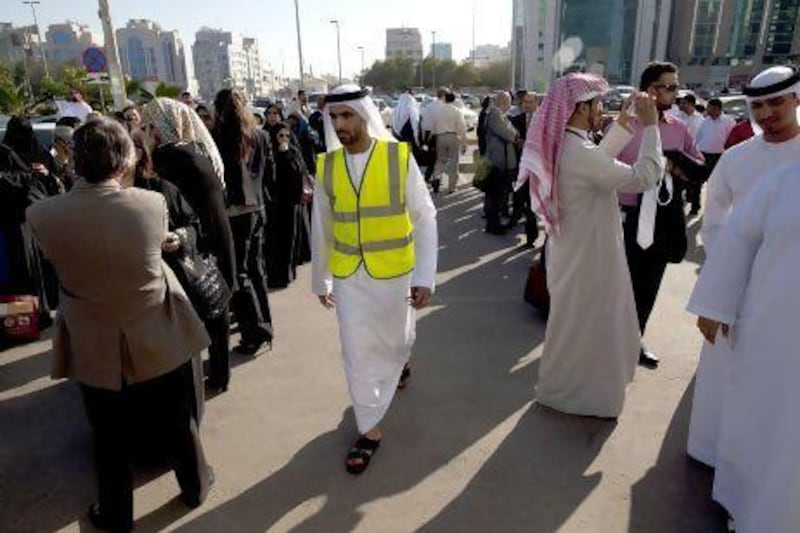ABU DHABI // Managers were quick to evacuate high-rise buildings when tremors from Iran's earthquake were felt in Abu Dhabi and Dubai.
From Abu Dhabi Mall and Sun Tower on Reem Island to along Sheikh Zayed Road and Tecom, skyscrapers were emptied after the 6.2-magnitude quake on Tuesday.
Many blamed social media for spreading panic despite there being no real threat to the UAE.
As Dr Abdullah Shanableh, of the University of Sharjah's seismic station, said on Tuesday: "We are so far away from any potential epicentre, we would only experience mild tremors.
"Before, nobody would know or even notice, now everybody knows almost immediately."
The National Emergency, Crisis and Disaster Management Authority (NCEMA) is the federal authority responsible for managing disasters in the UAE and serves as a national umbrella to ensure proper coordination and communication between all local and national government entities.
The authority was established in 2007 by a federal decree and has been operational since 2011.
"Not all threats facing nations, people and infrastructure are always manmade and technological, thus they may be caused by nature as well," says Sheikh Hazza bin Zayed, the authority's chairman, in its information booklet.
"Some threats may be avoided before occurring and some of the impacts from an emergency are dramatically reduced through preparedness."
He warns some threats are difficult to predict or avoid and the best solution is to be well prepared.
NCEMA's first real challenge as a coordinating body was in 2009, with the H1N1 flu virus. The authority gathered other organisations and placed the Ministry of Health as the lead agency.
Through joint efforts, all UAE ports and access points were fitted with H1N1 detection devices to filter out infected persons, precautionary vaccinations were provided and a quarantine centre for infected persons was set up. NCEMA's role involves coordinating all efforts - locally, federally, regionally and internationally - to effectively combat threats and risks.
Since its inception, the authority has been initiating well-studied countermeasures, developing comprehensive strategies and systems to manage crises and emergencies, to prevent and minimise future risks.
It consists of six departments - operations, planning, support services, information and communication technology, public information and safety and prevention.
"While key federal ministries, authorities and emergency-response agencies have major roles and responsibilities regarding the preparation of and the response to emergencies and crisis, a national organisation with a mandate to coordinate the system, its efforts and resources within the UAE provides an effective mechanism to achieve the best results," Sheikh Hazza states.
In the event of a crisis, NCEMA oversees and coordinates all relevant organisations, such as police, military and Civil Defence.
But all organisations still have a responsibility to prepare for, respond to and assist the country in its efforts to react to and recover from a major crisis or disaster.
That said, NCEMA issues the necessary directives to each agency when a crisis occurs and coordinates it all through its National Operations Centre, which opened last April.
The centre is equipped with monitoring, communications and command and control technology to execute operational plans.
The authority has also opened coordination and response offices across the country, to ensure guaranteed coordination at both local and federal levels.
In February, offices were opened in Fujairah, Ajman, Ras Al Khaimah, Sharjah and Umm Al Quwain, to work alongside the existing offices in Abu Dhabi and Dubai.
Since the beginning of this year, emergency response agreements have been signed with Emirates Airline, Etihad Airways and Air Arabia, so there are plans in place for evacuations if a crisis erupts unexpectedly.
"Managing emergencies requires exerting national efforts to support local governments, the private sector and the volunteer community," according to Sheikh Hazza.
"In protecting the nation, it is key for all organisations with emergency-management responsibilities to be aware of their roles and perform them efficiently and professionally."
[ amustafa@thenational.ae ]






